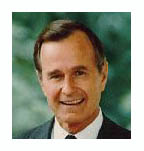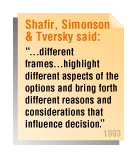
Framing II
Framing III
Framing IV
Framing V
Framing VI
Framing VII
Framing VIII
Media Framing
 The premiere framing institution
of our time, the American media dramatically shapes the way we
view current issues. As early as 1920, a scientist named Lippman
proposed that the media would control public opinion by focusing
attention on selected issues while ignoring others. Known as
the "agenda-setting" hypothesis, the idea that people
were easily susceptible to media influence was soon derided as
an overly simplistic misperception of the viewing audience.
The premiere framing institution
of our time, the American media dramatically shapes the way we
view current issues. As early as 1920, a scientist named Lippman
proposed that the media would control public opinion by focusing
attention on selected issues while ignoring others. Known as
the "agenda-setting" hypothesis, the idea that people
were easily susceptible to media influence was soon derided as
an overly simplistic misperception of the viewing audience.
Through most of this century, media pundits claimed that the
public wasn't susceptible to simple "hypodermic" injections
from the media (and you can still hear this defense put forward
by today's media moguls). But the agenda-setting hypothesis has
been revisited recently by scientists like Krosnick & Miller
(1996), who have traced surges and declines in presidential popularity
to media contextualizing.
In 1991, the gulf war dominated media coverage, pushing Bush's approval ratings to 90% after the war--the highest rating in American history. A short 12 months later, Bush was defeated at the polls. How could one of the most popular presidents in American history lose a subsequent election? There was no publicised scandal, no political gaffe, no international blunder that could explain Bush's misfortunes.
Media personalities often explain national changes in mood by denigrating the fickle, mindless American public. Remember when Dan Rather attributed the 1994 Republican wins to a public that threw a "tantrum"? But a fickle, mindless public isn't the answer either. The answer to national mood swings appears to be psychological rather than logical. Seemingly inconsequential changes in issue presentation have been shown to cause dramatic shifts in public preference.
Researchers Krosnick & Brannon (1993) used national survey data to answer this very question. During 1992, the media refocused its attentions from the war to the national economy. Based on sophisticated statistical analyses, Krosnick & Brannon demonstrated that this media refocus largely accounted for Bush's declining popularity in 1992.
Because of this and similar research, many media experts are once again viewing the public as passive recipients of "hypodermic" media injections. Yeah, that's right: people are told what to think by the media. And the vast majority of people obediently think as they're told. It's just human nature--who has the time or the energy to sort out all the issues one's self? The media does this for us. It offers us safe, often comforting opinions that appear to be the consensus of the nation. (The internet is a chink in the armor.)
 Communications scientist Robert
Entman (1993) states that "Journalists may follow the rules
for objective reporting and yet convey a dominant framing of
the news that prevents most audience members from making a balanced
assessment of a situation."
Communications scientist Robert
Entman (1993) states that "Journalists may follow the rules
for objective reporting and yet convey a dominant framing of
the news that prevents most audience members from making a balanced
assessment of a situation."
This requires that we ask a fundamental question: if media elites can effectively shape public opinion by emphasizing certain issues and ignoring others, what is the nature of a modern, media-dominated democracy?
Does public opinion reside in the minds of citizens, or is public opinion manufactured elsewhere and then merely deposited in the minds of citizens?
Entman thinks that attempting to determine the public's 'true' opinion is often a futile effort, since opinions can be as easily manufactured as they can be measured.
Continue for frame defense . . .
www.workingpsychology.com
All rights reserved.
